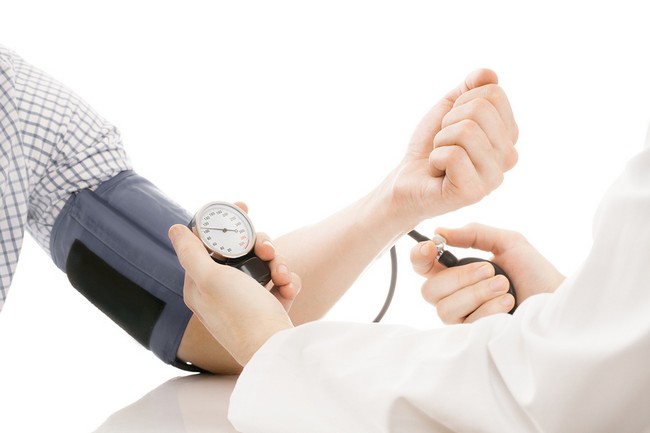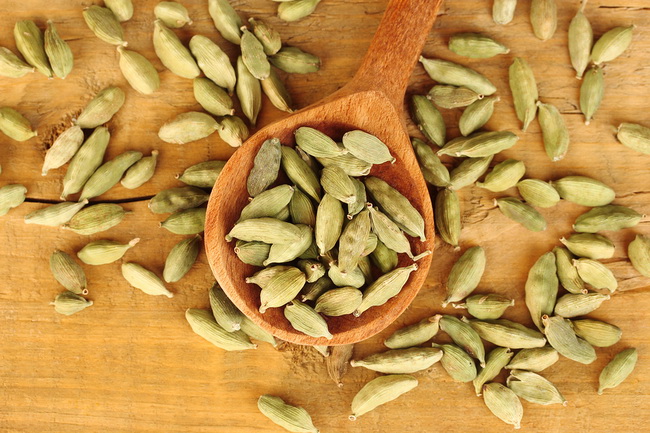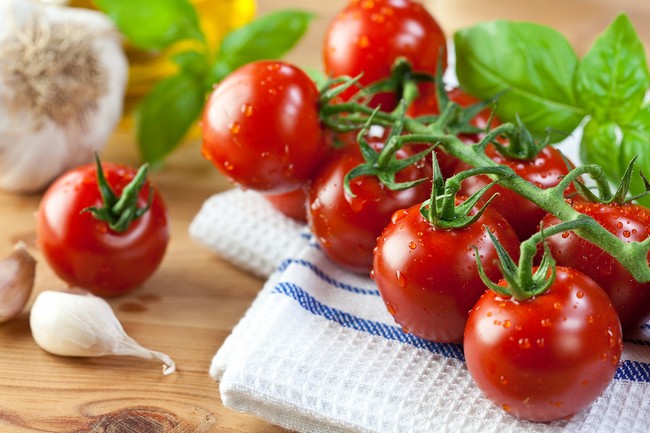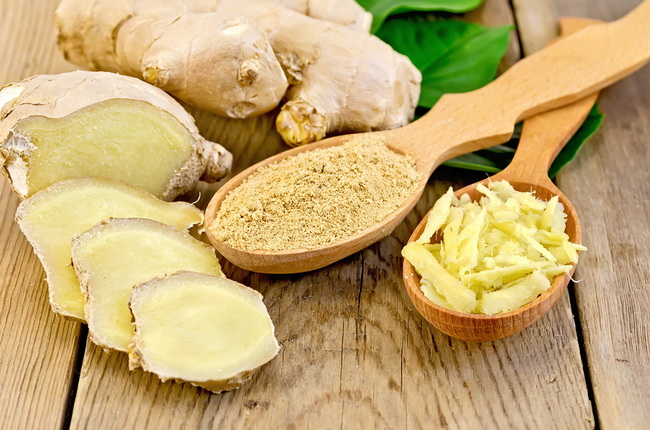- Make It Yourself Lavender Heart-Shaped Bath Bombs!
- 20 Things You Never Knew About “Down There”
- 12 Best Foods For Those Suffering From Arthritis Pain
- 12 Personal Hygiene Mistakes Almost Everyone Makes (Mom Never Told You About #4!)
- 15 Medicinal Plants And Herbs From The Cherokee People
- 12 Mind-Blowing Benefits Of Drinking Coconut Water During Pregnancy
- 12 Outstanding Winter Foods That Won’t Fatten You Up Like A Christmas Turkey
Best Foods and Herbs to Naturally Lower High Blood Pressure

Photo credit: bigstock.com
If you, or someone you know, have hypertension, then you know how serious this silent killer can be. You also know how difficult it can be to get it under control as well, even with medication. There are numerous factors as to why some people get high blood pressure and others don’t, including:
- Alcohol consumption levels
- Sodium and/or potassium levels
- Physical activity or lack of it
- Smoking
- Age
- Weight
- Family history
- Stress levels
- Personality traits
Although some of these factors are within your control (smoking, weight, alcohol consumption), others are not. Sometimes, high blood pressure is due to other factors, such as kidney disease, adrenal gland dysfunction or imbalances in the thyroid gland.
This is why it is important that you check with your doctor to try to determine the root cause. Change the things that might be contributing to your hypertension, such as losing weight or quitting smoking, but if your doctor should find that you have no physical reason for this problem (such as thyroid disease or kidney disease) then it’s time to look at some natural alternatives.
When hypertension is controlled early, it greatly reduces the risk of developing heart disease, kidney disease, brain hemorrhage, vision loss, or stroke. Always consult with your doctor before starting any herbal program to be certain that you are in good physical condition and that it won’t interfere with any other prescription drugs you might be taking. Pregnant women, nursing mothers, or women who are trying to become pregnant are especially vulnerable and you should always consult your OBGYN before consuming any herb, no matter how safe it might be considered to be.
Keep reading and find out which of these top 15 herbs can help you lower your blood pressure safely and naturally.
Continue to Page 2

Photo credit: bigstock.com
1. Cat’s Claw
This is an ancient Chinese herb that has been used in traditional Chinese medicine for thousands of years for high blood pressure, as well as neurological health issues. Studies involving cats claw as a treatment for high blood pressure shows that it helps by acting on the calcium channels in the body’s cells. Cat’s claw extract can be bought at any health food store in supplement form.
2. Garlic
Garlic has a long history of use as both a food and for medicinal purposes. Indigenous to central Asia, garlic has a multitude of studies which show that it can both prevent and reduce high blood pressure, which makes it one of the most heart friendly herbs around. Popular in many traditional dishes, especially in Asian cultures, studies done in vivo have shown that garlic can cause significant reductions in both diastolic and systolic blood pressure. Still other studies show that garlic can reduce the risk of blood clots as well as lowering cholesterol levels, which is another good thing for your heart. Consume as much raw garlic as you can or lightly cook it with your meals. Always choose organic garlic for your best health.
3. Lavender
You might think that this sweet flower is only good for sachets, but the truth is, this sweet smell has long been used as both a perfume and to induce calm and relaxation. You can use the essential oil for aromatherapy to relax your nerves and relieve stress, which will lower your blood pressure if it is due to stress or overwork. You can even eat the flowers, and both the leaves and flowers make an excellent tea.
Continue to Page 3

Photo credit: bigstock.com
4. Panax Ginseng
Sometimes called Asian ginseng, this is a different plant than Siberian ginseng or American ginseng, so don’t confuse them. Panax ginseng has been used in traditional Chinese medicine for thousands of years. It has also been mentioned by the National Center for Complementary and Alternative medicine for its ability to control hypertension. Numerous laboratory studies have shown that ginseng has the potential to be a useful treatment when it comes to the treatment of hypertension.
5. Celery Seed
You’ve probably used celery seed in your cooking dishes, but celery has long been used in China to help treat those with high blood pressure. You can simply juice the entire plant or consume the seeds via supplements or fresh, to help control your blood pressure. Celery is a natural diuretic, which might explain how it works on hypertension.
6. Cardamom
Another herb that you might have used in the kitchen. Cardamom has been used for centuries in traditional Indian dishes, but both the black and green varieties have been used as medicine in several indigenous cultures. The Indian Journal of Biochemistry and Biophysics published a study where 20 subjects with stage 1 hypertension were given cardamom, and it was discovered that this tasty spice was just an effective blood pressure lowering compound.
Continue to Page 4

Photo credit: bigstock.com
7. Cinnamon
Cinnamon is a super tasty spice that most people need little reason to add more of into their diet. Consuming cinnamon every day has been shown in studies to lower blood pressure in those who suffer from diabetes. Whether you suffer from diabetes or not, cinnamon is an excellent way to lower your blood pressure naturally by simply adding it to your morning coffee, cereal, toast, or oatmeal. You can add some cinnamon to your stew, stir fry, or vegetable dishes at dinner for some tasty hypertension relief.
8. Maitake Mushrooms
In Japan, these mushroom are called Maitake. In China, they go by the name Huishu Hua. Other names include shelf fungus, King of Mushrooms, the dancing mushroom, or even monkey’s bench. Regardless of the name, these mushrooms have been used for centuries for their antiviral compounds, but more recently, they have gotten a lot of attention as a treatment for diabetes, high cholesterol, obesity, and hypertension. The Journal of Scientific Vitamin published a study in 1989 which showed that taking maitake mushrooms daily; they significantly lowered the blood pressure of rats that were hypertensive. Another rat related study done in 2010 found that this King of Mushrooms could lower blood pressure that was caused by the aging process.
9. Basil
Basil is a staple in many kitchens, but did you know that it might also be able to lower your blood pressure? Basil extract has been shown to lower blood pressure, but only for brief periods. Adding fresh basil to your diet couldn’t be easier and it certainly won’t hurt you. Even if it is only for short periods, combined with other dietary changes, it might help. Basil is easy to grow and you can keep a small pot of this tasty herb in your kitchen or garden so you can easily add it to your meals anytime!
Continue to Page 5

Photo credit: bigstock.com
10. Tomato
OK, if you want to get technical, tomatoes are a fruit, but most refer to it as a vegetable. Whatever, tomatoes are key ingredients in many, many foods, so it isn’t often thought of as having medicinal value. However one study published in the American Heart Journal in 2006 found that subjects who had stage 1 hypertension had a significant reduction in their blood pressure when treated with tomato extract. Another study, this time out of Israel, found that tomato extract supplements improved the subjects hypertension when compared to the placebo group, Scientists believe that it is the high concentration of lycopene, beta carotene, and vitamin E in the tomato extract that does the job of lowering blood pressure so well.
11. Flaxseed
Flaxseed, thought to come to us from Egypt, is one superb herb when it comes to hypertension. Flaxseed contains a type of essential fatty acid called linolenic acid, which can not only manage the pain of arthritis and IBD, but can lower blood pressure as well. Some researchers also believe that it is the omega-3 fatty acids that help to lower blood pressure. One thing is certain; flaxseed will greatly reduce cholesterol levels, improve glucose tolerance, and is a super powerful antioxidant. In one study, subjects in Los Angeles, California, who were given flaxseed for 6 months, had their diastolic pressure dropped by 7mm Hg, and their systolic pressure dropped by 10mm Hg. That’s quite a drop for simply consuming some tasty little flaxseed.
12. Onions
Since onions are a close cousin of garlic, it’s no wonder that onions are perhaps one of the best natural treatments for high blood pressure. Onions contain high levels of quercetin, a type of antioxidant flavonol that is well-known for its ability to prevent heart disease and stroke. It’s believed that quercetin helps the body lower its production of a powerful compound which causes the blood vessels to constrict, this compound is angiotensin II. Studies have been done with onions showing that they can really reduce blood pressure levels. Subjects of one study who consumed onions had reductions of 7mm Hg systolic and 5mm Hg diastolic. Eating raw onions regularly can greatly help the arteries function properly. Onions can also reduce the viscosity, or stickiness, of the blood, which also helps to stop the formation of blood clots.
Continue to Page 6

Photo credit: bigstock.com
13. Ginger
Ginger is well-known as an herb that is used to fight nausea, vomiting, and hypertension. Commonly used in many Asian and Indian food dishes, ginger improves blood circulation by relaxing the muscles that surround the blood vessels. Ginger also lowers bad cholesterol levels in the blood, which if left uncontrolled, can lead to the formation of plaque in the artery walls. This can cause blockages in the blood vessels and arteries, which can cause high blood pressure. Ginger can prevent the formation of blood clots which can lower the risk of heart attack and stroke.
14. Chinese Hawthorn
Chinese hawthorn has been used by different cultures for the treatment of high blood pressure for thousands of years. There are also clinical trials which prove previous claims that Chinese hawthorn’s effectiveness in dealing with high blood pressure. This herb is loaded with two powerful antioxidant agents, flavonoids and oligomeric procyanidins, which are super good for the heart. Another compound, alkaloid rhynchophylline, which is very effective in preventing platelet aggregation and thrombosis. Scientists believe that this herb can lower blood pressure, prevent the buildup of plaque on the artery walls as well as thwart stroke by stopping the creation of blood clots in the heart and brain.
SEE ALSO: Can Drinking Red Wine Stop High Blood Pressure?
15. Carrots
It’s hard to believe that something as simple as carrots could lower your blood pressure, but it’s true. Well-known for their beta carotene content, carrots are super beneficial to the body. In fact, many believe that carrots might be one of the most beneficial vegetables for those with hypertension. Carrots are loaded with other powerful antioxidants, such as vitamins A and C. Antioxidants are known to help kill off free radicals which damage cells and DNA. Antioxidants also improve insulin resistance, as well as stimulating the function and dilation of the blood vessels. When the blood vessels are dilated, it will greatly reduce blood pressure. Carrots are also a super source of potassium, which reduces salt, and with lower salt levels in the body, blood pressure levels drop.
References:
































